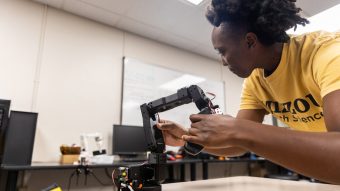May 11, 2021
High yield potential is often the top trait crop breeders consider, as higher yielding crops can lead to more money in a producer’s pocket. Researchers in the University of Missouri College of Agriculture, Food and Natural Resources (CAFNR) are conducting a variety of trait-related trials to try and help improve soybean breeding.
“Breeding is a process to test plants with varieties of gene combinations and select the best combinations regarding their yield and other desired traits,” said Jing Zhou, a doctoral student in bioengineering and a member of the Precision and Automated Agriculture Lab (PAAL). “The more combinations get tested in the beginning, the higher the chance is to select the best lines with optimal gene combination. However, the capacity of breeding tests is limited by the required labor inputs to measure yield. It is almost impossible to harvest tens of thousands of progeny rows individually in a 9-acre field within a short harvest window.”
To help overcome this challenge, researchers at the PAAL collaborated with their peers in the Division of Plant Sciences. They discovered that using unmanned aerial vehicle-based imagery and artificial intelligence can help quickly and accurately measure soybean yield for breeders.
“With this proposed method, human labor will be replaced by unmanned aerial vehicles (drones) and camera,” Zhou said. “The 9-acre field, for example, can be harvested and measured by two people in just a few hours. Therefore, the increased breeding capacity of the soybean breeding program will result in the significant improvement of the breeding efficiency.”
The team hopes the research will produce a high-throughput yield estimation tool for soybean breeders and lead to more efficient variety development and release.




